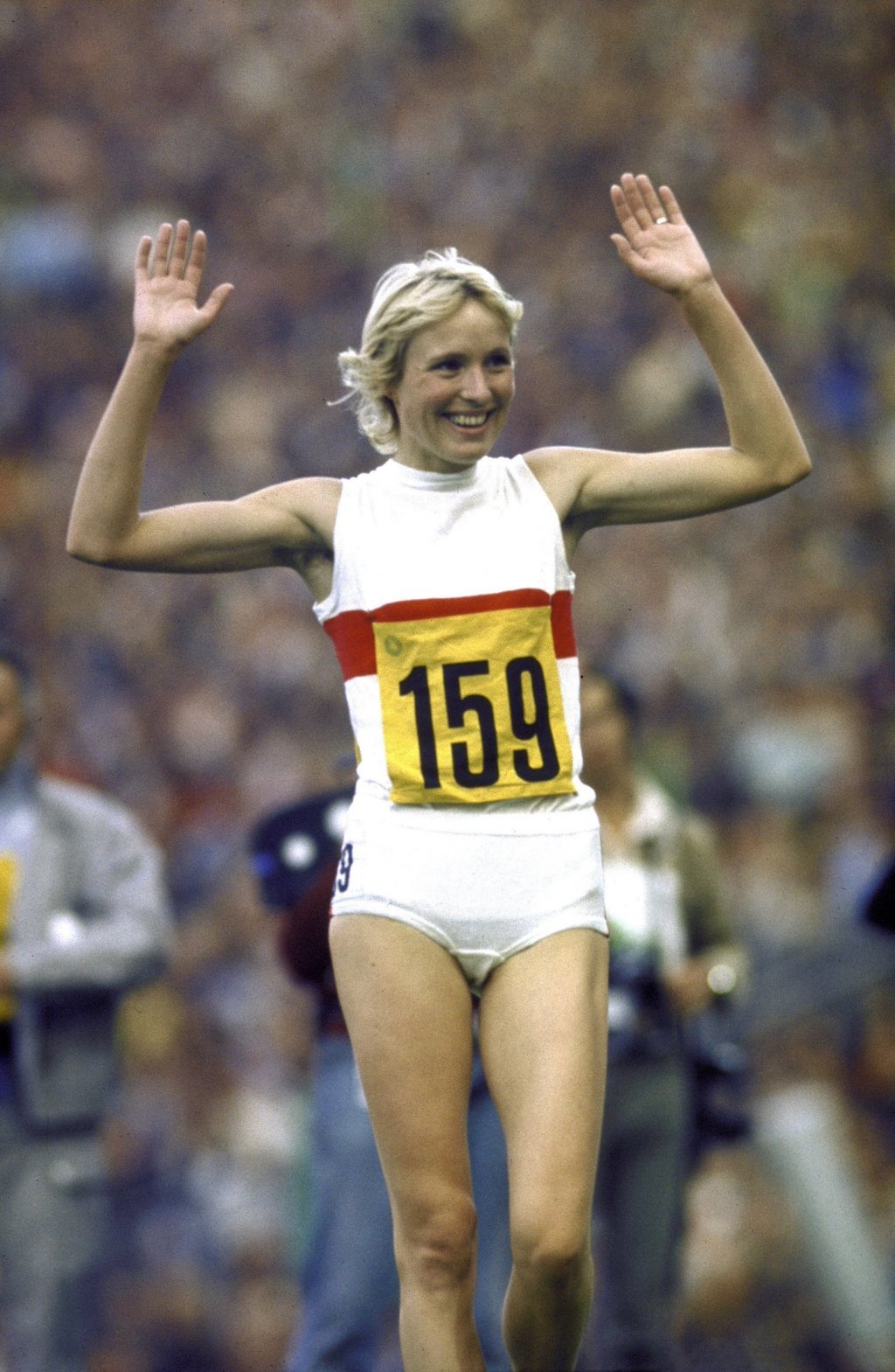World Record and Olympic Gold – Time Travel with Falck-Kimmich
In the women's 800m, beating the magical two-minute mark is not only an accolade but also an absolute necessity for international success. In the past, such a time was deemed completely unrealistic. But in 1971, Hildegard Falck-Kimmich became the first woman to undercut that mark when she crossed the finish line in Stuttgart in 1:58.5 minutes. The following year she became Olympic champion in her own country. In an exclusive interview with Falck-Kimmich, we embarked on a journey through time to mark the 50th anniversary of the Olympic Games in Munich’s Olympiapark and her grandiose successes.
© Bettmann/ Kontributor/ Getty Images
On 26 April 1966, the International Olympic Committee (IOC) awarded the 1972 Olympic Games to Munich, with the city winning out over Montreal, Madrid and Detroit. At that time, Lower Saxony-native was just 16 years old. She didn't have a strict focus on running yet. "I didn't just do athletics, I also swam and played handball." The dream of being an Olympic champion in her own country had not even occurred. "I was always a multisport athlete."
Two years later, in 1968, the opportunity arose to take part in the international youth camp at the Olympic Games in Mexico City. However, the trip was not strictly based on sporting merit: Questionnaires with multiple-choice answers, essays, multi-sport competitions, dance courses and choir participation were just some of the tasks required for consideration. The Federal Republic of Germany (FRG) wanted to use the event to present its best face to the world, one that demonstrated well-rounded youth. A selection of almost 400 young people met in Duisburg-Wedau. About 80 of them were selected, including Falck-Kimmich, whilst East Germany (GDR) sent 25 athletes. They helped make up a total of more than 1000 young people from all over the world that descended on Mexico.
On site there was the opportunity to view various sports venues and follow competitors, including Dick Fosbury (high jump) and Bob Beaman (long jump) in athletics. The time spent in Mexico was one of pure inspiration – a period that Falck-Kimmich still reminisces fondly about today. Among other things, she met her future husband Klaus Kimmich there. Their daughter would later follow in their footsteps as part of the International Youth Camp in 1996.
In 1968 there were no elite female 800m runners from West Germany at the Olympic Games. Falck-Kimmich had a personal best of around 2:08 minutes at the time. “I was already a very good middle-distance runner back then. And then I thought: well, wouldn’t it be incredible if I could manage to come to the games in my own country in 1972?” Her hunger was awoken. From then on, she dreamed of being able to experience the Olympic Games as an athlete, dedicating her training to this sole purpose. "It was clear to me that I wanted to be at the Olympic Games in Munich."
© Ed Lacey/Popperfoto / Kontributor/ Getty Images
THE PATH TO THE WORLD RECORD
At that time, however, there was still no talk of the impending world record and Olympic victory: "The first goal was just to be able to take part in the games in my own country." To achieve this, the young runner increased her training volume from three to four times a week to five.
1969: moon landing and injury
But then came a setback: a capsule tear in her upper ankle in the middle of a competition. Falck-Kimmich was pushed slightly during the race, leading to her stepping awkwardly on the verge between the running surface and the infield inside the track. The incident caused a severely sprained ankle, bringing her season to an abrupt end.
1970: founding of European Athletics and training success
Fortunately, the following year was injury-free. Falck-Kimmich remembers the good pre-season. In Berlin, she was able to reduce her personal best to a fabulous time of 2:02 minutes. Even the Yugoslav world record-holder Vera Nikolić could not prevail against the blonde from Nettelrede (today known as Bad Münder am Deister).
1971: first broadcast of German classic 'show with the mouse' and 800m world record
In the year before the Munich Olympic Games, Falck-Kimmich pulled off the ultimate coup. Together with her trainer, she opted to lead the 800m at the German Championships from gun to tape. Et voilà, world record! No pace, no calculations, just running. The then 22-year-old tackled the first 200 metres in a brisk 28.5 seconds. "It's common nowadays, but it wasn't so common back then." From the side-line, her coach shouted her split times. It soon became apparent she would not be hampered for starting so quickly. The three remaining 200m sections were each completed in around 30 seconds. And with that Falck-Kimmich had done it! She broke the previously unthinkable two-minute barrier, a goal she herself didn’t think achievable: "This world record in Stuttgart, with 1:58.5 minutes, came as a great surprise to me."
The training beforehand and the performance in other competitions were good and the barrier was shattered. She undercut Nikolić’s world record by almost 2.5 seconds. A quantum leap! With Ellen Tittel, Sylvia Schenk and Christa Merten, Falck-Kimmich was also able to celebrate a 4x800m relay world record.
The result of the European Championships in Helsinki was less pleasant. Getting tangled up with Gunhild Hoffmeister (GDR), Falck-Kimmich fell in the final in a scramble on the back straight. She would like to clarify rumours about the fall, as she has repeatedly been asked whether her East German competitor knowingly pushed her with malicious intent: "We both wanted to win, so you don't get involved in jostling. It was just a very unfortunate coincidence.”
1972: Star Trek and summer Olympics countdown
Before the highlight of the season, Falck-Kimmich was hoping for a third consecutive title at the German Championships with another start-to-finish victory. This time she tackled the first 400 metres in the Olympiastadium in Munich in a brisk 57.5 seconds, one second faster than at her world record performance from the previous year: "That didn't do me any good – I was overtaken by Sylvia Schenk in the last few metres on the home straight."
© Jerry Cooke / Kontributor/ Getty Images
OLYMPIC VICTORY IN MUNICH
With the thought in the back of her mind not to rush and avoid the scramble by all means, she competed in the Olympic Games in Munich, which were held from 26 August to 11 September. “I knew that I would be very careful in all three rounds, in the preliminary heats, semifinals and final. And if someone got too close to me, I would extend my elbows a bit. I had to do that in one run,” explains the former athlete with a laugh. It was Madeline Menning (USA), Olympic champion from 1968, who learned of Falck-Kimmich’s presence the hard way.
Despite years of preparation, there was a good deal of nervousness before the run. But at the start "the whole stadium was blocked out of my mind." The final had the right pace for Falck-Kimmich. “I was in the middle of the group and flowed with the group. And I've always just made sure that I find gaps somewhere to get out of there.” At the exit of the last bend, she seized her chance. "And then I saw a gap and sprinted forward." Commencing a final sprint so early is risky, but it was worth it. “I was then able to defend the lead I created to get out of the gap until I crossed the finish line.” Just 0.1 seconds later, Nijolė Sabaitė (USSR) crossed the finish line.
SUNDAY'S GOLDEN HOUR
"The murmurs and buzz in the stadium carried me. I can’t even describe it. But when I crossed the finish line, that was just absolutely amazing.” The crowd in the stadium had other successes to celebrate in the very same hour. 5 - 6 p.m. on 3 September became known as the sporting Golden Hour for the Federal Republic of Germany. In addition to Falck-Kimmich, Bernd Kannenberg also secured gold in the 50km race walk and Klaus Wolfermann in the javelin throw. In addition, Heide Rosendahl, the German face of the games at the time, won silver in the pentathlon.
"Of course, we congratulated and hugged each other and were happy together," remembers Falck-Kimmich. Her masseur had chilled a bottle of sparkling wine, but there was no time to celebrate with the other gold medallists. A few days later she would take bronze with the West German team in the 4x400m relay. Since then, the stars of the Golden Hour have met regularly in private, and at galas and the like. However, the topic of conversations is not always exclusively sport.
© Ed Lacey/Popperfoto / Kontributor/ Getty Images
TRAGEDY STRIKES
The cheerful 1972 Olympic Games had a tragic dark side. After her Olympic victory, Falck-Kimmich was taking a short break and preparing for the 4x400m relay in Gmund in a hotel on Tegernsee when she found out about the terrorist attack and kidnappings. “Of course, I myself have wonderful memories of Munich. What I only noticed from a distance, but what saddened me despite everything, is how political things […] made it possible for something like this to happen, that was so horrible.”
The games were paused and, after much deliberation, resumed with a one-day postponement. To this day, the memories of it have not faded. "It saddened me very, very much, also how it ended on the airfield." As an inseparable part of the history of 1972, commemoration of the victims of the terrorist attack also finds its place in this anniversary year.
SUSTAINABILITY: USE OF OLYMPIAPARK
Today the Olympiapark also functions as the memorial for the twelve victims, while the 85 hectares in the middle of the German metropolis continues to be the home of sport. "I think that Munich '72 benefited a lot from the Olympic Games."
By reusing the sports facilities, e. g. also for concerts etc., Munich’s Olympiapark remains the most sustainable Olympic venue. "The swimming pool in Olympiapark and the sports halls that are there are still being used." Such sustainable use over several decades is unique in the world. "The Rudi-Sedlmayer-Halle is also something that is used." It was built in 1972 for the Olympic basketball programme and has been the home of FC Bayern Basketball for many years. At the European Championships, the court will be prepared for the table tennis players. "I think it's nice how Munich has managed it."
ANTICIPATION OF MUNICH
The European Championships Munich 2022 are the largest multi-sport event in Germany since the Olympic Games in 1972. "I'm really looking forward to it, because I'll also be in Munich at the time."
Falck-Kimmich will mainly be attending the athletics competitions, although nine separate European championships will be held in the Bavarian state capital. Falck-Kimmich’s fingers will be crossed for Class of 22 athlete and 13-time German champion Christina Hering in the 800m. "I know her personally and I certainly wish her all the best and lots and lots of success."
Falck-Kimmich continues to follow the sport with passion and has one goal in mind for Hering: "She has to make the final, that’s a must."




